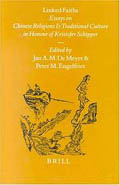start > Klassieke teksten > Late Han tot Tang > tekst
老君變化無極經 Laojun bianhua wuji jing
Engelse titel: Scripture of the Limitless Transformations of Lord Lao
Scripture of the Limidess Transformations of Lord Lao' Such is a possible translation of the title of this long poem of 369 seven-character verses. More likely, however, the title derives from the opening verse of the present poem: "Lord Lao transformed himself in the Wuji period." Wuji (Limitless) is a celestial era (tianshang nianhao) corresponding to the time of King You, when Laozi left China for the west. The present work belongs to the early texts of the Way of the Heavenly Master [..]
The poem consists of two parts.
The first part (112 verses) describes the successive transformations of Laozi in each of the five directions: (1) his departure to the West and the conversion of the barbarians; (2) his return to China as Li Hong and the investiture of Zhang Daoling as Heavenly Master; and his appearances (3) in the Eastern Sea, (4) the northern Dark River, and (5) among the southern barbarians (Zhang Lu).
In the second part (231 verses), the author begins by describing his flight from the north to the south around the time of the fall of the Western Jin (ca. A.D. 310). He continues with a complaint about the present situation, namely, the decay of both the civil government and the Heavenly Master organization (ca. 360). They will be restored by the True Lord of Great Peace (Taiping zhenjun), whose coming is expected apparently in the west (Sichuan), as the author intends to go there or has just arrived there.
At nearly every stage, and usually indicated by a change of rhyme, the narrative of both parts is interrupted by other narratives (such as the transmission of the Daodejing to the author, after the description of Laozi's departure to the west), by hymns on the Way, or by descriptions of methods and rites (such as the rites of sexual union, guodu) by which men and women can escape present and future disasters and obtain the status of Seed People (zhongmin).
The poem concludes with a coda (twenty-six verses) that recommends retirement from office, retreat into mountainous regions, ingestion of elixirs, and abstention from cereals. (Adrianus Dudink in Schipper 2004 p122-123).
Literatuur en vertalingen
Hieronder kunt u een selectie maken van de verschillende publicatievormen en de taal. Ik beperk me tot vier taalgebieden (Nederlands, Engels, Frans en Duits). De meeste literatuur is overigens engelstalig. U kunt bij teksttype ook apart de vertalingen selecteren en U kunt desgewenst ook een specifieke auteur zoeken.
Boeken 1 tot 3 van de 3

Burdorf, Suzanne (2011). Oraal Schrift of Schriftelijke Oraliteit: Het gedicht Laojun bianhua wuji jing 老君 變化無極經 en zijn verhouding tot de orale poëzie. *
Ook online.
Meer informatie...

Dudink, Ad (2000). The poem Laojun bianhua wuji jing 老君變化無極經: Introduction, summary, text and translation. In Jan de Meyer, Linked faiths, pag. 53-147 *. Brill
Ook online.
Meyer, Jan de, redactie (2000). Linked faiths: Essays on Chinese religions and traditional culture in honour of Kristofer Schipper. Brill.
ISBN13: 978-9004115408
Meer informatie...
Boeken 1 tot 3 van de 3

